
Discover the average professional organizer cost, what influences pricing, and how to budget for your next home organization project.
An organized kitchen can make cooking and cleaning a breeze


Navigating an avalanche of plastic containers or searching for that one spice in the back of your kitchen cabinet can make working in your kitchen feel stressful. Luckily, we have the tips and tricks you need to maximize your kitchen organization.
Investing in organizing your kitchen will transform your cooking capabilities and save time during every meal task. Searching through cabinets may seem easier than dedicating days to decluttering your kitchen, but with these 22 organizing kitchen tips, you’ll be organized in no time.
When determining how to organize your kitchen, take the time to understand which areas are functioning well and which ones aren’t. Look for overflowing cabinets, take note of items you use often but have difficulty getting out, and pinpoint which areas you clean most often. Some common problem areas include under the sink, utensil drawers, and pantries.
Don’t be scared to take an entire day with this step—it’s the key to creating a kitchen organization system that works.
It might sound weird that you have to make a mess to fix a mess, but it’s an essential step of any organization process. Pull everything out of your kitchen cabinets, drawers, and pantry and toss everything that is broken, expired, or unnecessary.
This step will help you pare down the number of items and appliances you need to organize. If you decide to keep a blender or stand mixer that’s on its last legs, follow these steps to make kitchen appliances last longer.
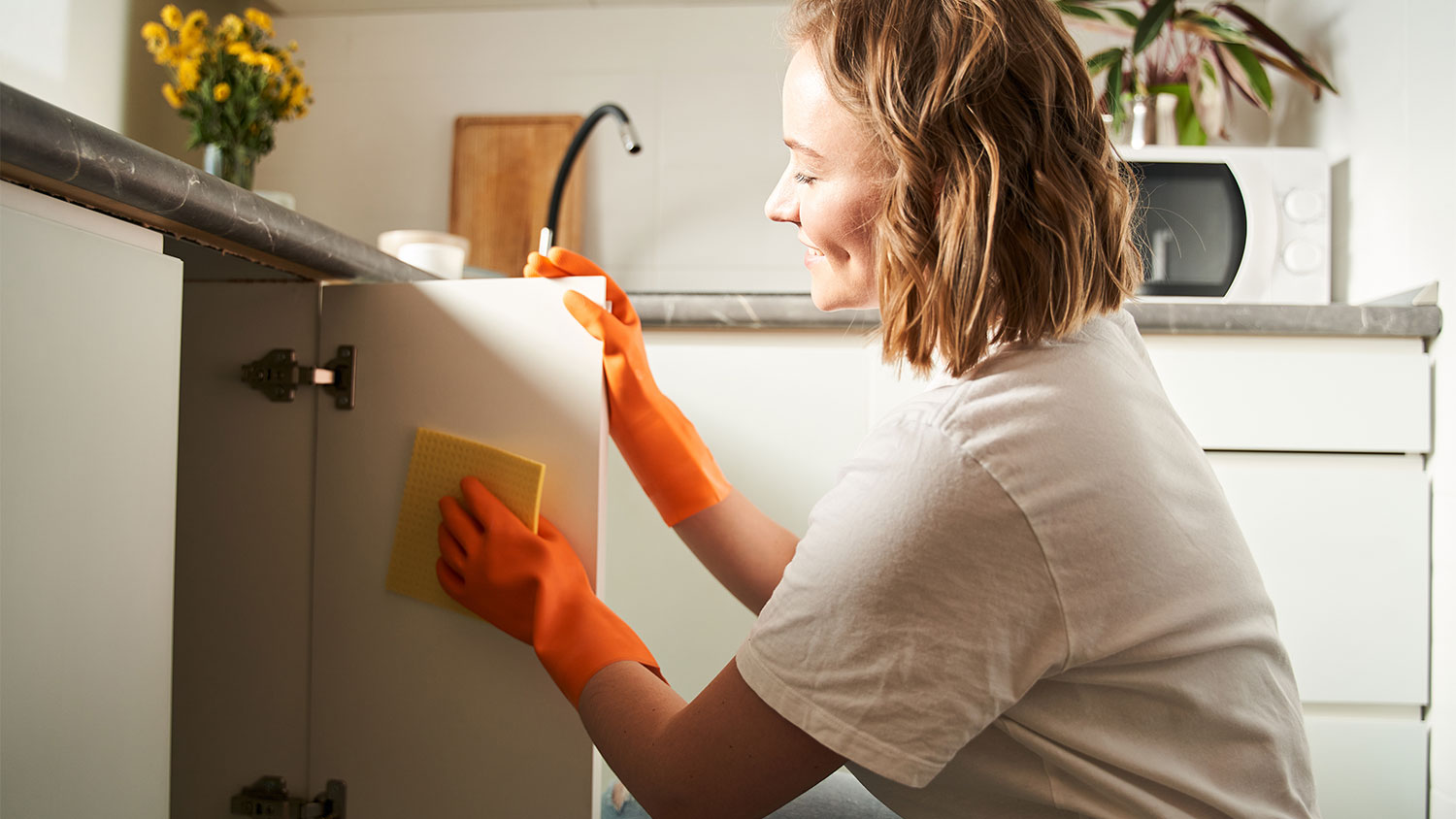
A major part of the kitchen organization process is cleaning while you go. Take the time to clean your kitchen cabinets and wipe everything down to make it nice and fresh.
Your kitchen cabinets are often not empty enough to clean every nook and cranny, so take advantage of it. Plus, this step will help ward off any household pests from creeping into your kitchen storage areas.
Now comes the hard part. Once you pull everything out and complete the first purge—dig deeper. As a rule of thumb, an item or appliance is likely not worth keeping if you haven’t used it in one year. It can be hard to part with your items, but in the end, your kitchen will look and feel lighter.
Consider paring down these kitchen items:
Mugs: Most people have more mugs than they typically use. Toss any chipped or broken mugs, and part ways with the ones in the back of the kitchen cabinet.
Pans: That badly burnt pan you’ve had since college? Toss it. Evaluate which pans you use on a regular basis, and find a new home for the others.
Cups: It’s easy to unintentionally collect plastic and glass cups over time. If they don’t easily stack, are discolored and stained, or have cracks, get rid of them.
Appliances: If you haven’t taken an appliance out of the package more than once, it’s worth donating to a local charity.
Identifying where certain items should go is a valuable part of the organization process. The easier it is to put something back in its place, the more likely you will stay organized.
A popular way to divide up a kitchen is to use zones. With zones, you store similar items together in areas of the kitchen that make the most sense. For example, you can store glassware and bowls next to the dishwasher, which will make it easier to empty it after a cycle is complete.
There’s no right or wrong answer to how to organize a kitchen in zones. Check out our infographic below for a sample breakdown.

If you have a kitchen island, ensure you’re using it to its fullest potential. Instead of only utilizing it to prepare and serve dinner, use sections of it as permanent storage or display space. Use stylish baskets to store your dish towels, keep your aesthetic mixing bowls out (doubling as storage and decor), or stack your cookbook collection. Most importantly, don’t forget to add wiping down the island to your list of daily kitchen cleaning tasks.
The next time your trash can is empty, throw a few extra bags at the bottom of the bin. Then, when you need a new bag, you can easily grab and go without having to look for a new one. This tip is especially helpful if you don’t have room to store your trash bags in your kitchen, but don’t want to have to walk to another part of the house every time you need to refill the trash bin.
If you’re an avid baker or reach for certain spices over and over again, don’t be afraid to leave these items out for easy access. Save yourself the hassle of searching for these items and find a solution that allows them to stay accessible without getting in the way. For example, a magnetic system can be a great way to store spices so that they’re always reachable.
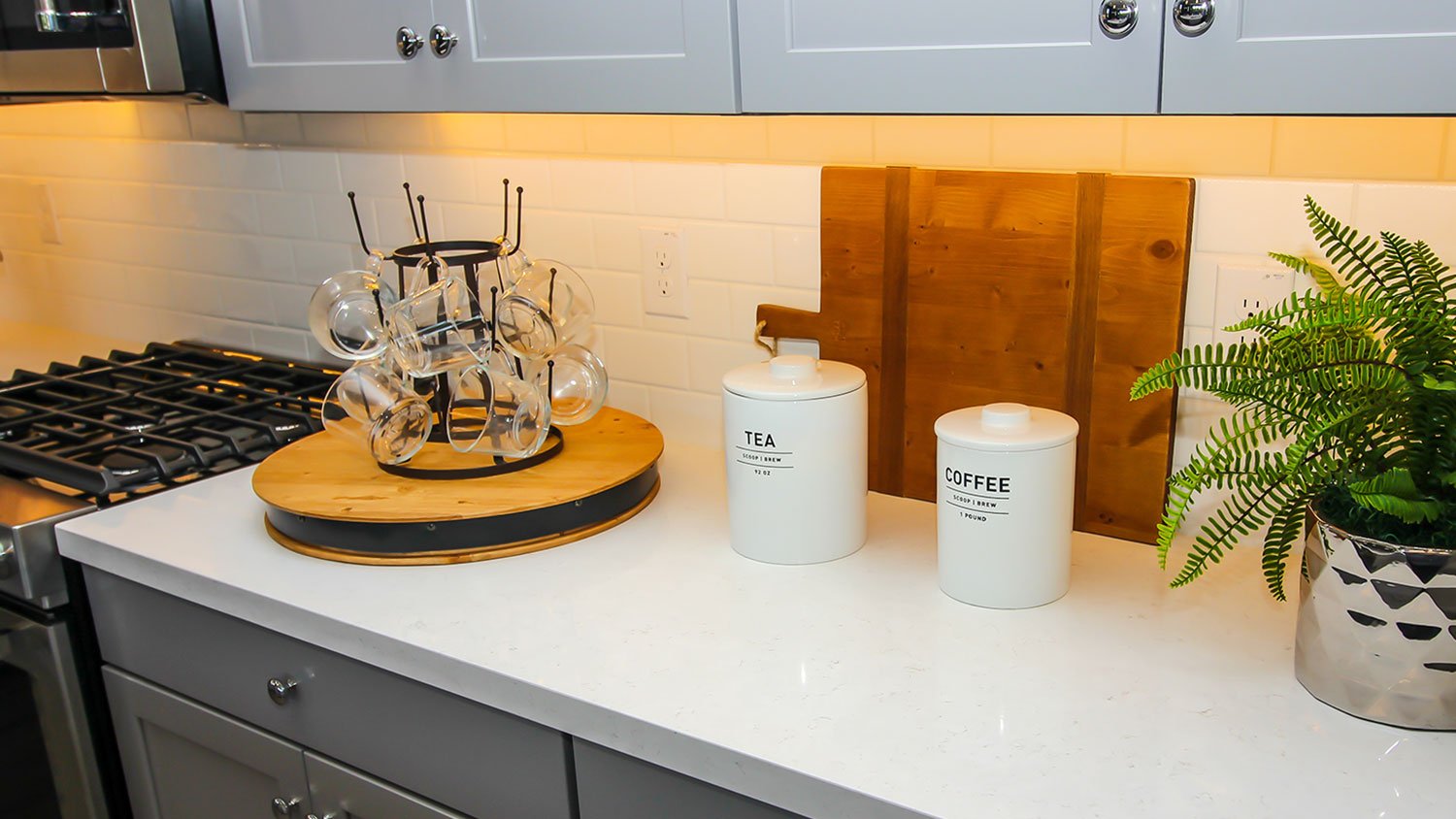
Turntables aren’t only for spinning tunes anymore—they’re also a popular way to organize spices, oils, and other kitchen items. A turntable allows easier access to items that often get thrown to the back of a cabinet. Add a turntable to a kitchen cabinet so that you can simply spin the device to look through your options. You can also install a similar type of turntable inside your refrigerator for maximum fridge organization.
Clear or wire bins are very popular tools for keeping your kitchen organized, and for a good reason. The ability to see the items or snacks you have makes it easier to stay on top of your stockpile without adding duplicates or creating extra clutter.
Plus, using clear or wire organizers will allow you to reduce some of the clutter in high-traffic areas, like your pantry, and make it easier to find what you need when you need it.
Struggling to find space in your kitchen? Look up. Double your usable space by building a helper shelf inside your kitchen cabinets or investing in a vertical cart.
You should also consider storing less-used appliances on top of your kitchen cabinets, and then use a step stool to retrieve them when needed. That way, you can free up some storage space for items and appliances that you use on a regular basis.

Drawers are very useful in the kitchen, but without dividers, finding what you need becomes more cumbersome than useful.
Use drawer dividers, baskets, or tension rods to create designated areas for items such as utensils, cutlery, pot holders, and more. This tip will help you keep each item in its designated place and prevent your drawers from becoming a cluttered junk drawer.
Keeping the contents of your kitchen cabinets neat and tidy can be difficult, especially if you have open kitchen shelving that puts your stacks on display. Luckily, there are many types of wire racks available that can help you declutter your kitchen cabinets.
Use wire racks to stack cups and plates together, hold your Tupperware lids, or add an extra row of spices to your cabinet. These tools are especially useful for organizing pot and pan lids in lower cabinets. If you’re organizing on a budget, check out your local thrift store to find affordable options.
If you have room in your kitchen, purchase heavy-duty hooks and screw them under cabinets or into your walls to display pots and pans neatly and make them accessible at all times.
This method also frees up a shelf or two, which can be valuable real estate in a small kitchen. Consider adding an overhead hanging pot rack to create a storage solution that looks and feels like a professional kitchen.

Take inspiration from Julia Child’s kitchen layout and install pegboard on one of your kitchen walls or inside kitchen cabinets to give kitchen essentials a designated space. That way, you’ll be able to easily find and replace tools or appliances as you use them. You can also paint the pegboard so it blends in with the design aesthetic of your kitchen.
It can be easy to forget about the fridge, but an organized refrigerator is an important part of a successful kitchen. You can set up zones in your fridge, like areas for leftovers, sauces, fruits, and vegetables, so your household members know where each type of perishable food should go. Fridge organizers can be very helpful for easily storing like-items, plus it makes it easier to clean.
Did you know that the ridges at the bottom of your freezer can actually be useful in organizing your frozen foods? It’s true; you can slide thinner items like meat trays or frozen dinners between the ridges like a filing system. These ridges can help keep things in place without sliding every time you reach for your favorite pint of ice cream.
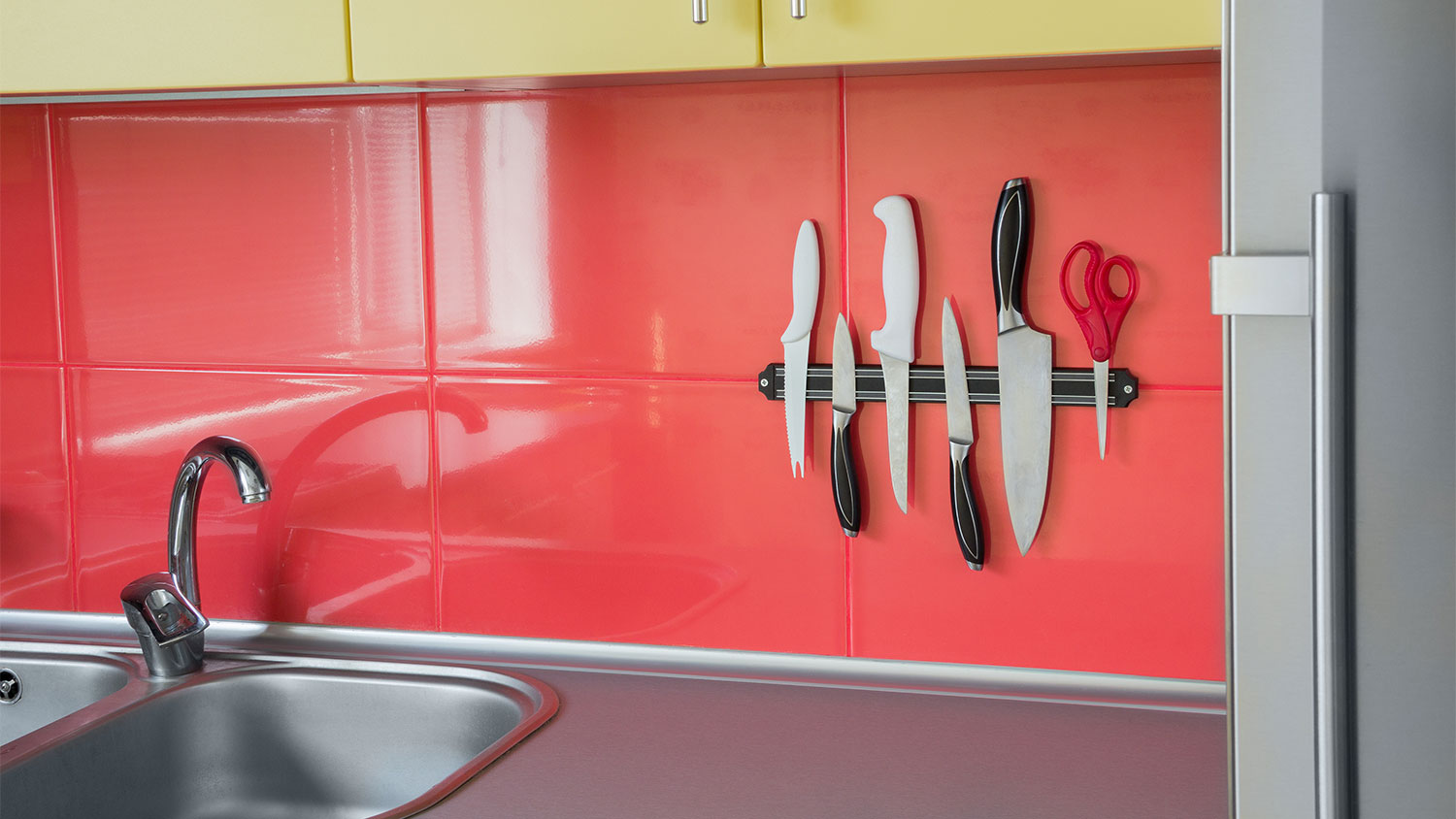
Countertop space is precious, so carefully consider the items that stay on top of it. Take back the countertop in a small kitchen by paring it down to the essentials, like small, everyday appliances. Items like knife blocks and cookbooks can take up a lot of space. Instead, consider relocating these items to other areas of your kitchen, like a magnetic knife strip or the kitchen island.
If your kids tend to disregard your kitchen organization plan, create a space that’s only for them.In a lower cabinet, designate a kid-friendly area for snacks, cups, lunch boxes, and storage containers that can get messy without ruining other zones in your kitchen. This tactic may also help make your young child feel more independent and give you a bit of extra help with cleaning and organizing.
Even when you follow the best organizing kitchen tips, this room will likely become the hot spot for everything extra in the house. Instead of fighting it—embrace it.
Create one drop zone area in your kitchen, like a junk drawer, for all the random knick-knacks that find their way into that room. This catch-all space can help keep the rest of the kitchen in tip-top shape and prevent you from rummaging through every kitchen cabinet when something goes missing.

Organizing is an ongoing process. Although some of these tasks are big steps, once you get the bulk of it done, it’s time to live in the organized space. Once you start going through your daily routine, you’ll likely discover ways to adjust your organization plan for better efficiency. For example, you may find that the utensils you thought would fit best in a drawer next to the oven work better in a flatware holder.
The good news is nothing is set in stone, so as you start to cook in your kitchen, make changes. The best way to organize your kitchen for maximum efficiency is to maintain and continue to progress.
Kitchen organization can be a time-consuming challenge, especially in a large space. If you need assistance developing a kitchen storage plan that works for your home, consider hiring a local professional organizer to get the job done.
The average cost of hiring a professional organizer is between $55 to $85 per hour. If you only need help organizing the kitchen, it will take less time than hiring a pro to revamp your entire house.
From average costs to expert advice, get all the answers you need to get your job done.

Discover the average professional organizer cost, what influences pricing, and how to budget for your next home organization project.

If your home is a bit messy, that’s perfectly normal. Trusting a professional home organizer to revamp your space can be worth the cost. Here’s how to find and hire a professional organizer.
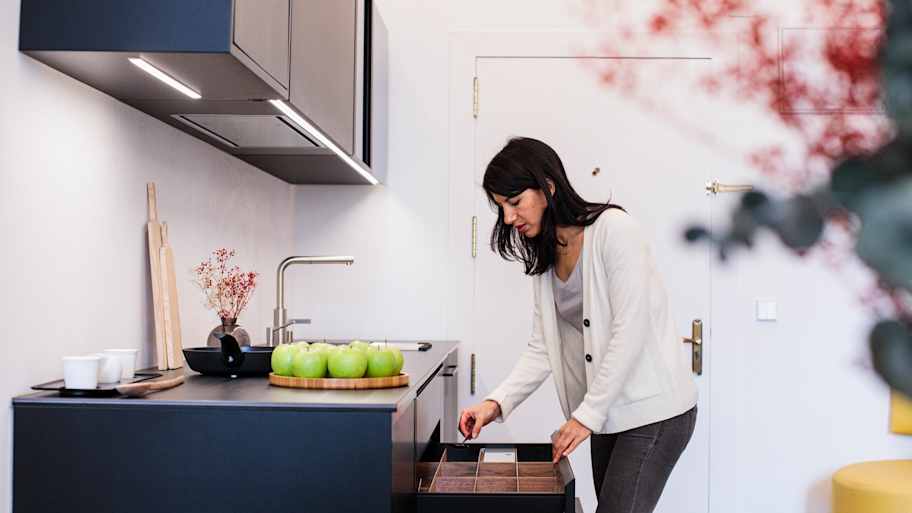
These kitchen drawer organization tips will reduce time spent rifling through the kitchen looking for what you need. Learn how to organize your kitchen.
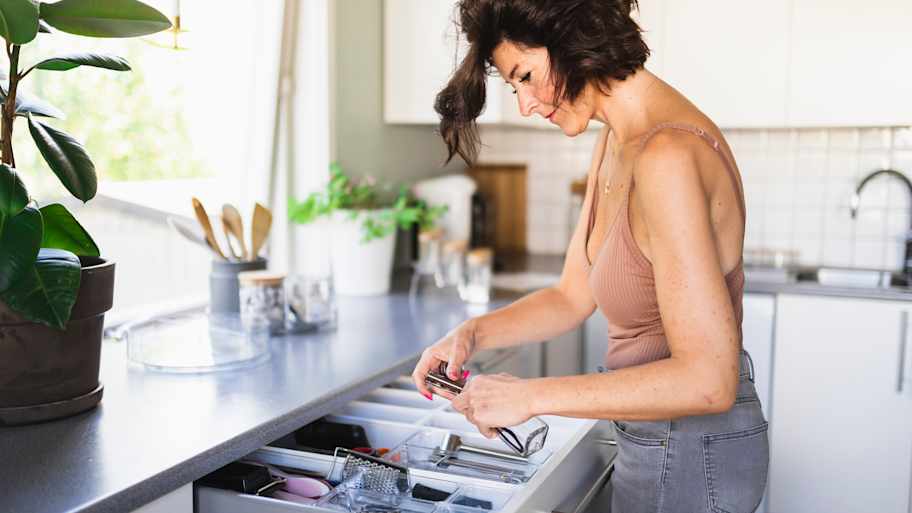
Declutter and maximize your space with these eight smart storage tips for messy closets, cupboards, and drawers around your home.
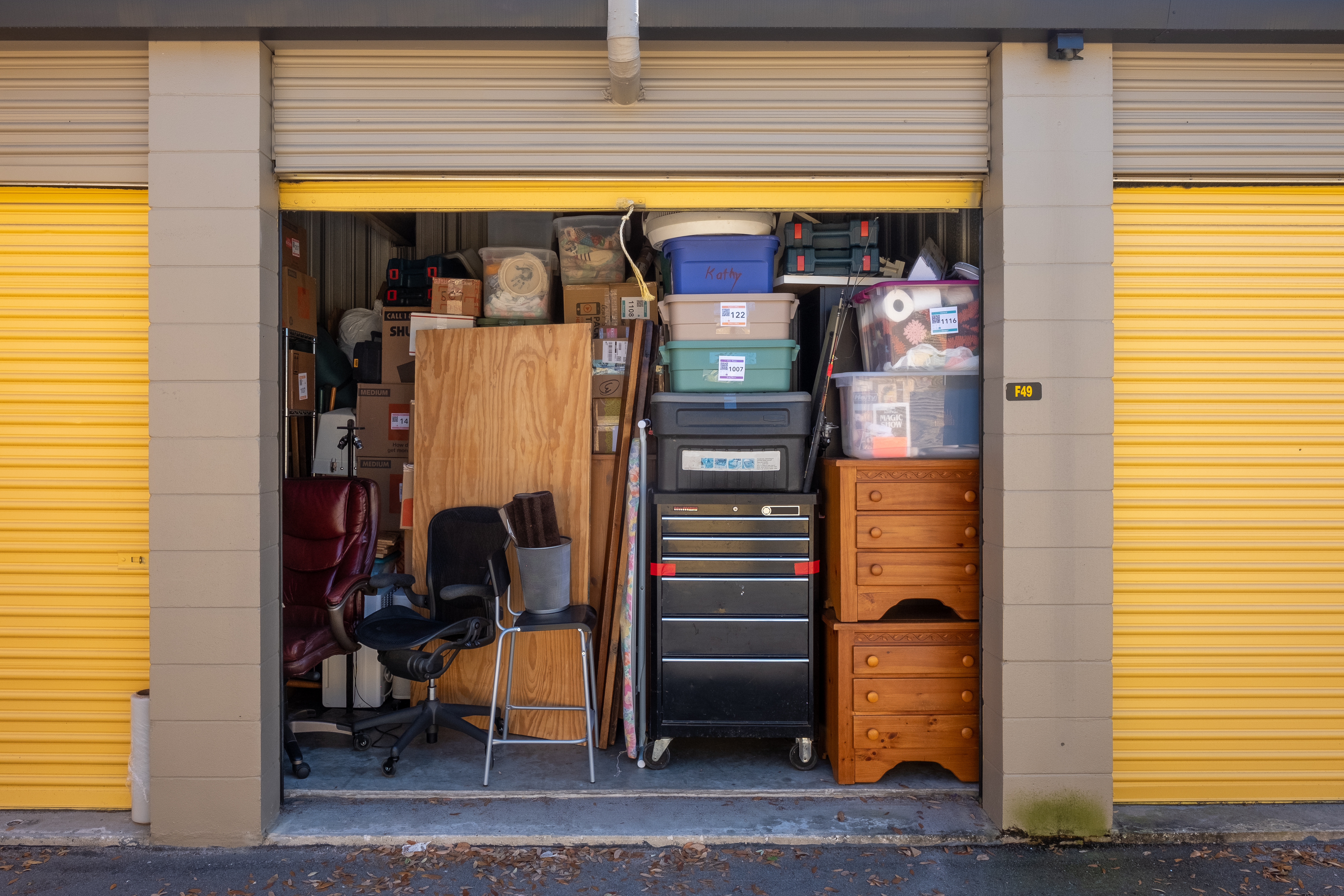
Maximize space and save money with these expert storage unit tips. Smart packing strategies and organization hacks included.

When was the last time you cleaned out your spice rack or linen closet? Our list of 12 things to get rid of in just one hour helps you toss what is old, expired, or no longer needed. Decluttering is faster and easier than you might think.